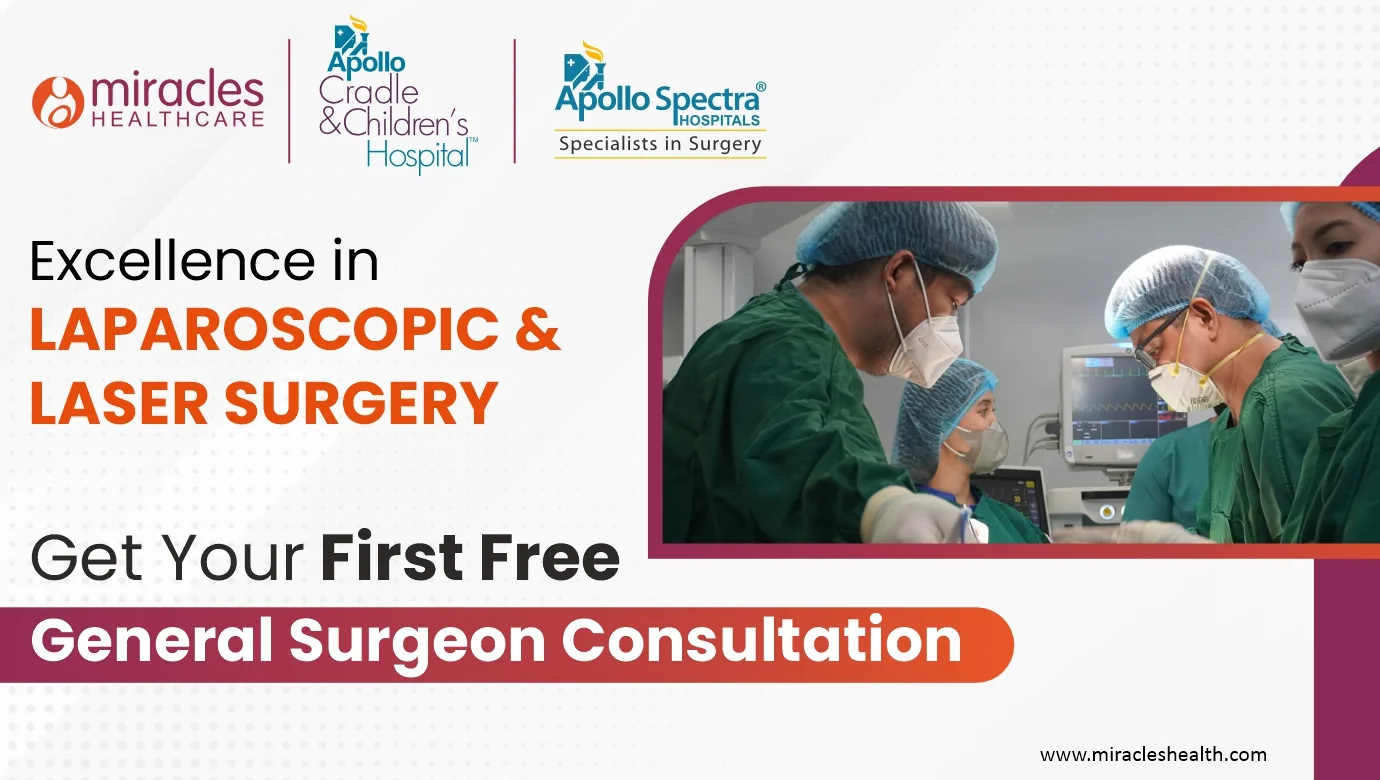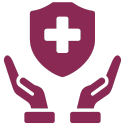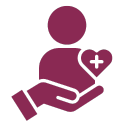General Surgery Conditions We Treat
Comprehensive Care for Your Health

Laser treatment for varicose veins involves using focused light energy to heat and close off problematic veins. This minimally invasive procedure offers accurate targeting, less discomfort, and quicker recovery than traditional surgery, making it a popular choice for treating varicose veins.
Varicose veins are enlarged, twisted veins that often appear blue or dark purple and usually occur in the legs. The spider veins develop when the valves in the veins weaken or fail, causing blood to pool and the veins to swell. This condition is common and can be caused by factors like prolonged standing or sitting, genetics, age, obesity, and pregnancy.
Laser treatment for varicose veins, known as endovenous laser ablation (EVLA) or endovenous laser therapy (EVLT), is a minimally invasive procedure used to treat varicose veins. During the procedure, a thin laser fiber is inserted into the affected vein through a tiny incision. The laser emits concentrated light energy, which heats and damages the vein, causing it to collapse and be reabsorbed by the body. Laser varicose veins offer several advantages over traditional vein stripping surgery, including less pain, faster recovery, and minimal scarring. It is a safe and effective option for reducing symptoms and improving the appearance of varicose veins.
Relieves symptoms: Laser treatment for varicose veins can alleviate symptoms such as pain, heaviness, swelling, and discomfort associated with varicose veins.
Improves appearance: It reduces the appearance of varicose veins, improving the cosmetic appearance of the legs.
Prevents complications: Treating varicose veins helps prevent potential complications such as skin ulcers, blood clots, and venous insufficiency.
Minimally invasive: Varicose veins laser therapy is a minimally invasive procedure that typically requires only local anesthesia and involves smaller incisions, leading to quicker recovery times and less postoperative discomfort compared to traditional surgery.
High success rate: Laser treatment has a high success rate in closing off faulty veins and reducing symptoms, with minimal risk of recurrence.
Outpatient procedure: It can often be performed as an outpatient procedure, allowing patients to return home the same day and resume normal activities relatively quickly.
Customizable treatment: laser operation for varicose veins can be tailored to the individual patient's needs, targeting specific veins while minimizing damage to surrounding tissues.
Long-term benefits: Laser treatment offers long-term relief from varicose vein symptoms and can improve the overall quality of life for patients.
The right candidate for varicose laser treatment typically indicates the following characteristics:
Candidates need to undergo a thorough evaluation and consultation with a vascular specialist or vein specialist to determine their suitability for spider vein therapy and to discuss personalized treatment options.
To prepare for laser varicose veins treatment, consider the following steps:
Consultation with a specialist: Schedule an online consultation with a vascular specialist or vein specialist who can evaluate your condition, discuss treatment options, and provide personalized recommendations.
Medical history review: Provide your medical history, including any previous vein treatments, surgeries, or medications, as well as any allergies or medical conditions you have.
Discontinue certain medications: Your doctor may advise you to stop taking certain medications, such as blood thinners or anti-inflammatory drugs, a few days before the procedure to reduce the risk of bleeding or other complications. Follow your doctor's instructions regarding medication adjustments carefully.
Compression stockings: Your surgeon may recommend wearing compression stockings before and after the procedure to improve the flow of blood and reduce swelling. Ensure you have the correct size and compression level as prescribed.
Dress comfortably: Wear loose, comfortable clothing on the day of the procedure, as well as flat shoes that are easy to put on and take off.
Hydrate and avoid food: Follow any detailed pre-procedure fasting instructions provided by your doctor, and stay hydrated by drinking plenty of water unless instructed otherwise.
Follow pre-procedure instructions: Your doctor may provide additional pre-procedure instructions specific to your case. Make sure to follow these instructions closely to ensure the best possible outcome from the treatment.
Laser varicose vein treatment is generally performed as follows:
Preparation: Before the procedure starts, the patient's legs are cleaned and sterilized, and local anesthesia is administered to numb the area where the treatment will be performed.
Vein mapping: Using ultrasound guidance, the surgeon identifies the affected vein and maps its path to ensure accurate placement of the laser fiber.
Insertion of laser fiber: A small incision is made near the targeted vein, and a thin laser fiber is inserted through a catheter or sheath into the vein under ultrasound guidance. The laser fiber is positioned at the proper location along the length of the vein.
Energy delivery: Once the laser fiber is in place, it emits concentrated light energy, usually in the form of laser heat. This energy heats and damages the vein wall, causing it to collapse and seal shut.
Vein closure: As the vein collapses, blood flow is rerouted to healthier veins nearby, and the treated vein is eventually absorbed by the body over time.
Post-procedure care: After the laser treatment is completed, the incision site may be covered with a bandage, and compression stockings may be applied to the treated leg to promote healing and reduce swelling. Patients are typically able to resume normal activities shortly after the procedure, although strenuous exercise and heavy lifting may be restricted for a short period.
After laser varicose veins treatment, patients can expect the following:
Discomfort and bruising: Mild discomfort or soreness at the incision site is common, along with some bruising. This generally resolves within a few days to a couple of weeks.
Compression stockings: Patients may be advised to wear compression stockings for a specified period after the procedure to promote healing, reduce swelling, and support circulation.
Activity restrictions: Strenuous activities, heavy lifting, and prolonged standing or sitting may be restricted for a short period following the procedure to allow for proper healing. Most patients can resume normal activities within a day or two, but specific restrictions may vary depending on personal circumstances.
Healing time: The treated vein gradually closes and is absorbed by the body over time. Patients may notice a decrease in the appearance of varicose veins and an improvement in symptoms such as pain, swelling, and discomfort as the healing process progresses.
Follow-up appointments: Patients typically have follow-up appointments with their surgeon to monitor healing progress, assess treatment outcomes, and address any concerns or complications that may arise.
Long-term results: Laser varicose veins treatment offers long-term relief from symptoms and can improve the appearance of varicose veins.
Potential side effects: While complications are rare, patients should be aware of potential side effects such as infection, nerve injury, or blood clots. It's essential to promptly report any unusual symptoms or concerns to your surgeon.
Overall, most patients experience significant improvement in symptoms and appearance after laser varicose veins treatment, with a relatively quick recovery period compared to traditional surgery.
Laser treatment for varicose veins offers several advantages compared to traditional surgical methods:
Minimally invasive: Laser treatment is minimally invasive, meaning it requires only small incisions in the skin. This results in less trauma to the surrounding tissues and a quicker recovery time.
Less pain: Patients often experience less pain and discomfort during and after laser treatment compared to traditional surgery. This is because the procedure targets the veins with precision, minimizing damage to surrounding tissue.
No general anesthesia: Laser treatment can often be performed under local anesthesia or mild sedation, eliminating the need for general anesthesia. This reduces the risks associated with being under general anesthesia and allows for a quicker recovery.
Faster recovery: Since laser treatment is minimally invasive, patients typically experience a faster recovery time compared to traditional surgery. Most of the patients can resume their normal activities within a few days to a week after the procedure.
Reduced risk of complications: Laser treatment reduces the risk of complications such as infection, nerve damage, and scarring compared to traditional surgery.
Improved cosmesis: Laser treatment leaves minimal scarring and requires smaller incisions, resulting in better cosmetic outcomes compared to traditional surgery, where larger incisions may be necessary.
Effective: Laser treatment is highly effective in treating varicose veins, with many patients experiencing significant improvement in symptoms such as pain, swelling, and leg discomfort.
Outpatient procedure: Laser treatment is usually performed on an outpatient basis, meaning patients can go home the same day as the procedure. This eliminates the need for a hospital stay, reducing healthcare costs and inconvenience for the patient.
Overall, varicose laser treatment offers a safe, effective, and minimally invasive option for treating varicose veins, with fewer risks and a quicker recovery compared to traditional surgical methods.
After laser varicose veins treatment, it's essential to follow these care instructions to ensure proper healing and optimal outcomes:
Wear compression stockings: Your healthcare provider may recommend wearing compression stockings for a specified period after the procedure to promote blood circulation, reduce swelling, and support vein healing. Follow their instructions regarding the duration and level of compression needed.
Stay active: Engage in light physical activity, such as walking, to promote blood flow and prevent blood clots. Avoid prolonged periods of sitting or standing, and aim to move your legs regularly throughout the day.
Avoid strenuous activities: Refrain from heavy lifting, strenuous exercise, or activities that may strain the treated area for a specified period after the procedure. Follow your healthcare provider's recommendations regarding activity restrictions.
Keep the treatment area clean: Keep the incision site clean and dry to reduce the risk of infection. Follow any specific wound care instructions provided by your surgeon, such as gently washing the area with soap and water and applying an antiseptic ointment if necessary.
Monitor for complications: Watch for signs of complications such as increased pain, swelling, redness, warmth, or drainage from the incision site. Report any unusual symptoms or concerns to your surgeons promptly.
Follow-up appointments: Attend all scheduled follow-up appointments with your surgeon to monitor healing progress, assess treatment outcomes, and address any questions or concerns you may have.
Maintain a healthy lifestyle: Eat a balanced diet, stay hydrated, and avoid smoking, as these habits can promote overall vascular health and support the healing process. Continue to wear compression stockings as recommended and follow any additional lifestyle recommendations provided by your surgeon.
By following these care instructions and staying in communication with your surgeon, you can help ensure a smooth recovery and optimal results from laser varicose veins treatment.
While laser treatment for varicose veins is generally considered safe and effective, like any medical procedure, it does carry some risks and potential complications. Some of these risks include:
Bruising and Swelling: Mild bruising and swelling are common after laser treatment for varicose veins. These usually resolve independently within a few weeks but can be uncomfortable for some patients.
Pain: Some patients may experience pain as well as discomfort during or after the procedure. This can usually be managed with over-the-counter pain medication or prescribed pain relievers.
Skin Burns: In rare cases, laser treatment may cause burns to the skin. This risk is higher if the laser energy is not properly calibrated or if the skin is not adequately protected during the procedure.
Skin Discoloration: Changes in skin pigmentation, such as darkening or lightening of the skin, may occur after laser treatment. These changes are usually temporary but can be permanent in rare cases.
Nerve Damage: There is a small risk of nerve damage during laser treatment, which can cause numbness, tingling, or other sensory changes in the treated area.
Blood Clots: Although rare, laser treatment for varicose veins can increase the risk of blood clots, especially in patients with pre-existing risk factors such as a history of deep vein thrombosis (DVT) or a family history of blood clotting disorders.
Recurrence of Varicose Veins: While laser treatment is highly effective in treating varicose veins, there is a possibility of vein recurrence over time. This may require additional treatment or procedures to address.
Allergic Reactions: Some patients may experience allergic reactions to the anesthesia, medications, or materials used during the procedure. These reactions can range from mild itching or rash to more severe symptoms such as difficulty breathing.
Infection: Although rare, there is a risk of infection at the site of treatment or in the surrounding tissues. Proper wound care and hygiene can help reduce this risk.
Patients need to discuss these potential risks and complications with their surgeon before undergoing laser treatment for varicose veins. Additionally, choosing a qualified and experienced surgeon can help minimize these risks and ensure a successful outcome.
Several factors can influence the cost of Varicose veins laser therapy, including:
The severity of the condition: The extent and severity of the varicose veins can affect the complexity of the procedure and, consequently, the cost of treatment.
Treatment facility: The type of hospital where the procedure is performed can impact the cost. Prices may vary between hospitals, outpatient clinics, or specialized vein centers.
Geographic location: Treatment costs can vary significantly depending on the region where the procedure is performed.
Surgeon's expertise: The experience and expertise of the surgeon performing the procedure can affect the cost. Highly skilled and experienced specialists may charge higher fees for their services than less experienced surgeons.
Additional services: Additional services such as pre-procedure consultations, ultrasound imaging, follow-up appointments, and post-procedure care may be included in the overall treatment cost.
Insurance coverage: The coverage for laser varicose veins treatment can vary depending on the individual's insurance plan and policy. Some insurance plans may cover all or part of the treatment cost, while others may require out-of-pocket payments.
Combination treatments: If additional treatments or procedures are performed with laser treatment, the overall cost may be higher.
Patients should consult with their surgeon and insurance company to understand the specific factors influencing the cost of laser varicose veins treatment and to obtain accurate cost estimates based on their circumstances.
Miracles Apollo Cradle/Spectra is renowned as the best hospital for laser varicose veins treatment. Our facility boasts an exceptional team of experienced general surgeons in Gurgaon who specialize in laser spider veins treatment. With state-of-the-art technology and a patient- centric approach, we ensure the highest quality of care and optimal outcomes for our patients.
Say goodbye to varicose veins! Schedule your laser treatment for varicose veins with the general surgeon near you for flawless legs and a healthier you. Book your online consultation now and step into a vein-free future.


Comprehensive Care for Your Health
Meet our expert team of General Surgeon where compassionate care meets expertise.
Inspiring Journeys: True Patient Stories
Miracles Apollo Cradle is a leading Maternity Hospital Gurgaon. We strive to give the best care to our patients.






Your Health, Our Network: Comprehensive Care Across Every Facility.
Learn about the world class health care we provide
Expert Advice and Health Tips
Learn about the world class health care we provide
Yes, laser treatment is effective for treating varicose veins, providing relief with minimal invasion.
Varicose veins typically begin to fade within a few weeks, with full results visible after a few months.
The procedure is generally well-tolerated with mild discomfort, often described as a minor stinging sensation.
The cost of laser treatment for varicose veins varies depending on the extent of the condition, the experience of the surgeon, and the location of the clinic.